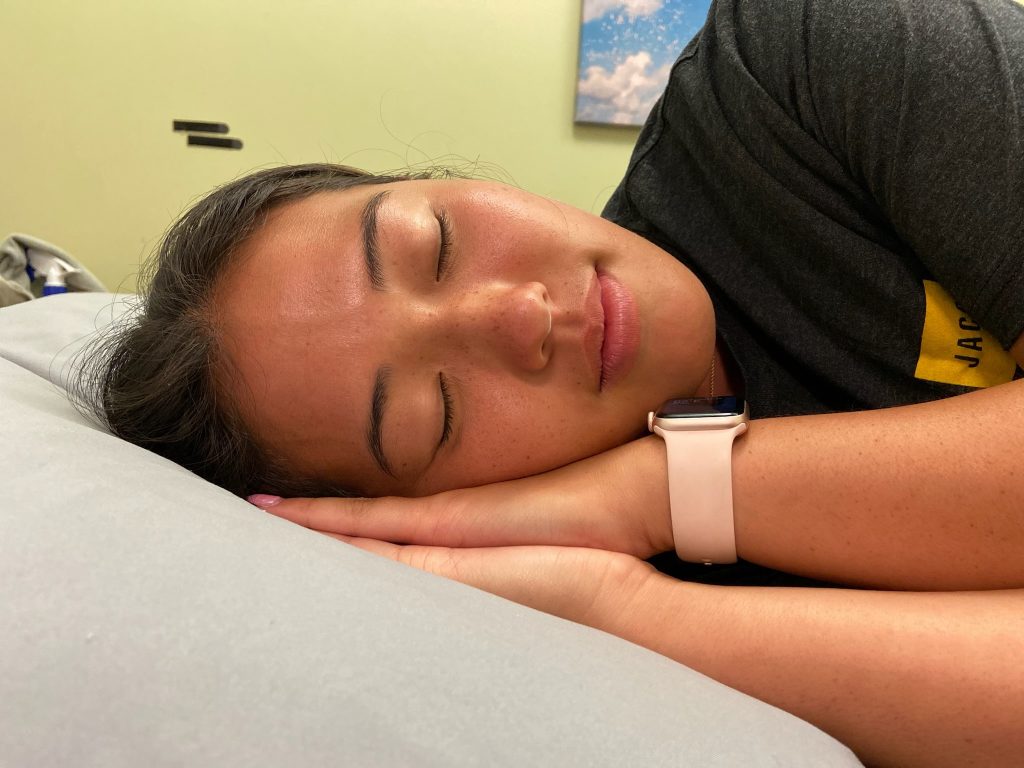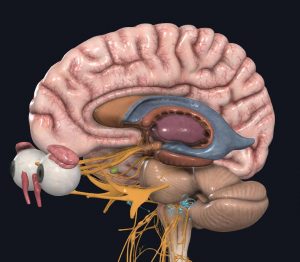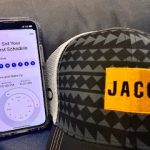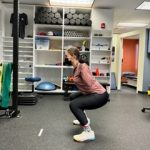
How many of us catch ourselves running on 5-6 hours of sleep per night trying to meet all our work, family, and personal obligations?
How many of us hit that snooze button every morning for another 10-15 minutes of sleep because it’s already 5 AM and you feel like you haven’t slept a wink?
How many of us say to ourselves, “It’s fine, I’ll just catch up on sleep over the weekend”?
Well, you are not alone.
According to the American Sleep Apnea Association, at least 70% of adults in the U.S. report poor sleep at least one night a month, and 11% of adults report poor sleep every night.
They also estimate that sleep-related problems affect 50-70 MILLION Americans regardless of age and socioeconomic factors.
If you fall under one of these statistics and you’re recovering from an injury or surgery, that’s a huge problem! Sleep is incredibly important to recovery.
Here are a few tips to ensure you get better sleep quality and make the most out of your rehab. Improve your sleep and recover faster!
How Much Sleep Do I Really Need?
The Centers for Disease Control and Prevention (CDC) has a great chart on their website listing how many hours of sleep per night an individual needs based on their age. If you’re interested in specifics you can take a closer look here.
Most people think that, as we age, we continue to require less sleep per night to function properly. That’s actually not the case.
As we age, we still require a minimum of 7 hours of sleep per night. This is despite general changes in sleep efficiency, quality and quantity, and timing.
In fact, the CDC defines short sleep as less than 7 hours of sleep per night. Sleeping less than this amount has been found to increase the risk of heart attack, stroke, arthritis, depression, and diabetes among other things.
So many people lack an adequate amount of sleep that it is now considered a public health crisis by the CDC.
Next time you think about cutting sleep short to binge-watch that Netflix series, please reconsider!
Sleep’s Role in Learning, Memory, and Tissue Healing
Sleep consists of two different stages: Non-Rapid Eye Movement (NREM) sleep and Rapid Eye Movement (REM) sleep. The substages of NREM sleep plays a different but equally important role in rehab and recovery.
REM Sleep
REM sleep is associated with dreaming. It is less likely to assist with rehab and recovery, but it does play a large role in creativity!
You can thank REM sleep for your fun and challenging exercise regimen created by your physical therapist after a restful night’s sleep.
NREM Sleep
NREM sleep occurs prior to REM sleep in the sleep cycle. It typically lasts 90-120 minutes and can be further divided into light and deep stages.
Light NREM sleep primarily occurs in the earlier morning hours has been shown to improve the efficiency of learning new information and tasks. Think about all the new exercises you learn while in physical therapy, and how they play a critical role in your recovery. For example, proper light NREM sleep the night before your physical therapy sessions can help you better absorb your session. You’ll be able to learn those new exercises correctly and apply it into your home exercise program.
In contrast, Deep NREM sleep which occurs in the early evening hours. It helps with remembering new information and tasks. Think about how many times your therapist asks if you’ve been doing your home exercise program or “homework”. For example, deep NREM sleep the night after your physical therapy sessions can help you remember your homework. You’ll likely to get an A+!
Regardless of NREM’s stage, it’s critical for learning, memory, and performance. Numerous studies have shown that sleeping less than 8 hours per night can negatively impact:
- time to physical exhaustion – you get tired faster
- aerobic capacity – you get winded quicker
- muscular endurance – muscles fatigue occurs sooner
- vertical jump height – less power generation
Tissue Healing
According to the Cleveland Clinic, deep NREM sleep helps release hormones that are important for tissue healing.
A hormone is a chemical that acts as a messenger in the body. It signals our organs and body cells to perform a specific task.
During deep NREM sleep, growth hormone is produced by the pituitary gland in the brain. It is sent to the liver where insulin-like growth factor 1 (IGF-1) is produced. IGF-1 aids in cell reproduction and cell regeneration, resulting in the building of muscle and healing of tissues.
- The tiny pituitary gland (highlighted in green)
Images courtesy of Complete Anatomy
Without sleep, less growth hormone is produced by the brain, which hinders cell regeneration. Sleep is critical to wound healing and muscle building, just like diet and exercise!
Don’t skip sleep before a physical therapy session, training session, or competition!
7 Ways to Improve Sleep and Recovery
“If sleep is so important to my rehab and recovery, how then do I improve my sleep!?”
Excellent question.
The first step is to try arranging your sleep schedule to fit at least 7 hours of sleep per night.
This may be an unrealistic option for some due to work, child care, and other obligations. If increasing your sleep quantity is not an option, there are some other tips from the Mayo Clinic and University of Kentucky Medical Center.
Here are a few ways to improve your sleep hygiene: (1,2)
- Stick to a Schedule
- Avoid Late Caffeine
1. Stick to a Sleep Schedule
Try to go to bed and get up at the same time every day, including weekends. Your body naturally develops a sleep-wake cycle over time, and being consistent with this cycle can help you fall asleep faster and stay asleep longer without interruptions.
2. Create a Restful Sleeping Environment
Keep your room cool, dark, and quiet. You can use blackout shades, earplugs, noise-canceling headphones, or fans.
Try to also limit exposure to light-emitting sources 30 minutes before bedtime. These include your cell phone and TV! The blue light emitted from these electronics can suppress the production of melatonin, the hormone responsible for initiating sleep.
One helpful tip is to activate Night Mode on your mobile device. It can help block some of the blue light emissions. Alternatively, you can purchase a cheap pair of blue light glasses which filter the light emissions from your phone.
If you can’t fall asleep within 20 minutes, do something relaxing. Meditation, hot baths, or gentle stretching are great ideas. Avoid anything that gets your heart rate pumping.
3. Limit Daytime Naps
Limit naps to 30-60 minutes and avoid napping later in the day. Naps can affect your established sleep-wake cycle, which makes it harder for you to fall asleep later.
4. Limit Caffeinated Foods/Drinks, Alcohol, and Nicotine Before Bedtime
Don’t consume caffeinated substances 3-4 hours before bedtime. They make it harder fall asleep and may result in broken sleep.
Some examples of common caffeinated foods/drinks include tea, coffee, chocolate, and soft drinks.
5. Avoid Eating Large Meals, Consuming Spicy Foods, or Drinking A Lot of Liquid Before Bedtime
You want a 2-3 hour gap before bedtime, to be exact.
Your digestive system typically slows down while you sleep, so it’s common to develop acid reflux after consuming large meals right before bedtime. Instead, have a light snack.
Also, by limiting liquid consumption before bed, you also limit your trips to the bathroom mid-snooze.
6. Be Sure to Exercise
Moderate to vigorous-intensity exercise can help you fall asleep and stay asleep longer. Just remember to avoid exercising 2-3 hours before bedtime as it can stimulate your body and brain.
7. Avoid Taking Unprescribed or Over-the-Counter Sleeping Pills
If nothing above seems to help, talk to your doctor or healthcare professional about your troubled sleeping.
You and your healthcare providers can more accurately diagnose the cause, and together, you can determine the next best steps to getting you more Zs.
Sleep Well, Recovery Well
If you or someone you know needs help recovering from an injury or surgery, have them seek physical therapy services with us! We would be happy to help.
Please call JACO Rehab at (808) 381 – 8947 to schedule an appointment. Mahalo!
Citations
1. Catherine F. Siengsukon, Mayis Al-dughmi, Suzanne Stevens, Sleep Health Promotion: Practical Information for Physical Therapists, Physical Therapy, Volume 97, Issue 8, August 2017, Pages 826–836, https://doi.org/10.1093/ptj/pzx057
2. Staff, Mayo Clinic. “6 Steps to Better Sleep.” Mayo Clinic, Mayo Foundation for Medical Education and Research, 7 May 2022, https://www.mayoclinic.org/healthy-lifestyle/adult-health/in-depth/sleep/art-20048379.



